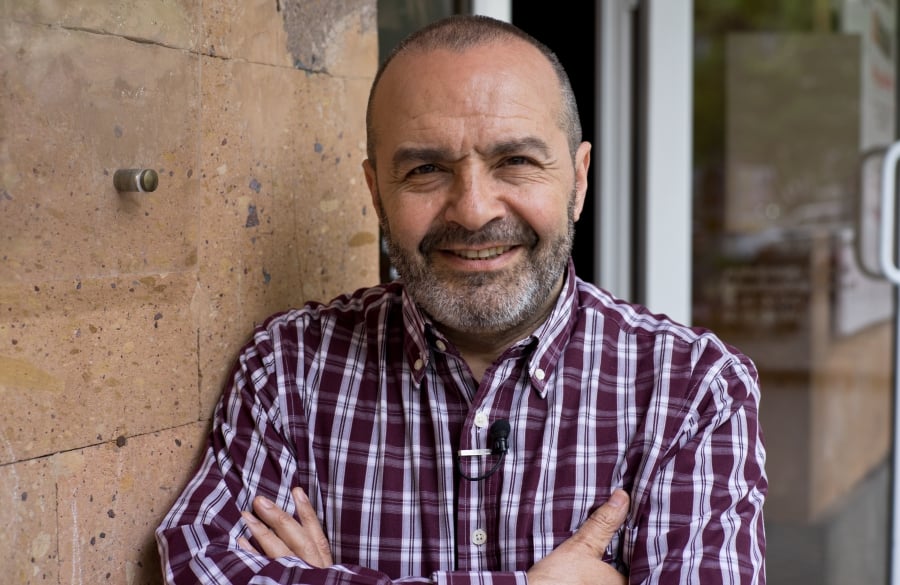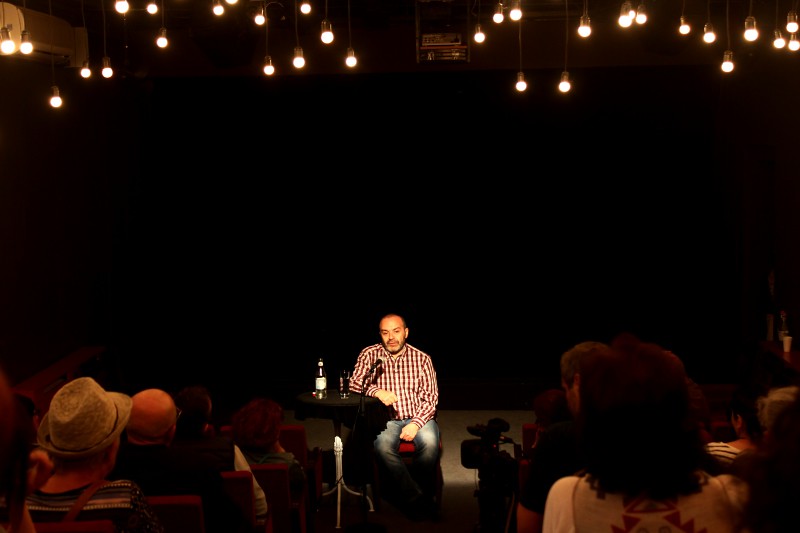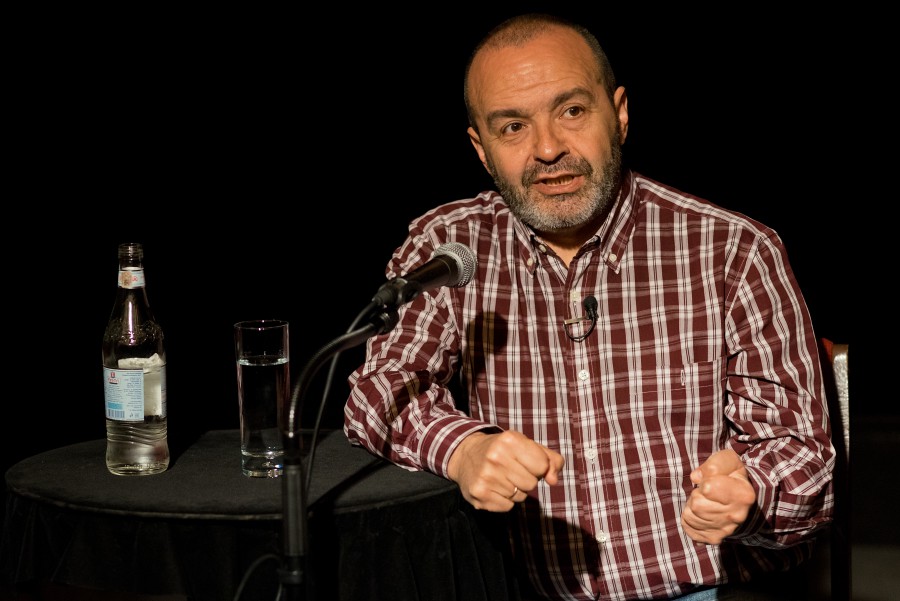
Writer, publicist Viktor Shenderovich is one of the prominent figures of contemporary Russia. All his writing (literary, journalistic, and sketch) is armed with cleansing irony and edgy emphases.
He writes succinct pieces with humor and condensed meaning that merge the subject of the day with high literature. Over the years, his audience likewise has become condensed and tempered. The political satire TV show Kukly (Puppets) for which he was the scriptwriter was shut down; as a result, he became an undesirable person not only in television, which has an audience of a million, but also on many other platforms.
But in this situation too he is a symbolic figure. With his almost daily writing, he reminds us of human dignity and the right to create freely.
Upon the invitation of Media Initiatives Center [also responsible for this site], Victor Shenderovich visited Yerevan and had a few public meetings with local residents.
“Outside of us, there’s nothing. And if there’s freedom, it’s within us. And you can’t do anything about inner freedom from outside. Even if it’s hell outside,” he said during his meetings in Yerevan. And he quoted Benjamin Franklin: Those who give up liberty for more security deserve neither liberty nor security.
Shenderovich said that finding himself under pressure and the threat of even physical reckoning, he was well aware that he was left with two paths: emigration or degradation. Not preparing to leave Russia, Shenderovich is sure that if you stay in your country, being silent is incomprehensible. And he writes at those few platforms that remain and speaks for those for whom analyzing is a habit. “It remains to politely insist upon the rules of life that you consider right,” he says.
And he reminds us that everyone has a very thin layer of civility. And if effort is exerted, that layer may be eliminated in a few days. That is, in a few days, you can turn a person into an animal. “Our elite very successfully used humankind’s shortcomings and meanness, accustomed [people] to evil as an everyday phenomenon,” he says.
Is there a big difference between your journalistic and literary texts, or is the boundary between the two seamless?
Journalism is a huge profession with a dozen subdivisions. Of course I’m not a journalist, but one of the aspects of my work is publicizing, which is not traditional analytical, information journalism. As a publicist, I express my feelings and attitudes. That’s my job — I can even say it’s my obligation.
I consider myself a man of literature.
Humor is your everyday work material. To what extent are you able to introduce and embed it in your writing as both a shield and a tool that pierces?
I embed nothing: I think that’s a wrong, even technically flawed approach. Because if you usually write in a somber style, but then you try to find places in your writing where you can insert jokes and gags (thinking that your writing will be read more easily that way), the result is a piece that’s not viable.
I think what’s important is completely different. Humor, irony are signs of intellect. Irony is the ability to look at a situation from outside. And that’s why it’s pleasant to deal with a person who can speak about himself with irony, because he looks at himself from outside.

Irony and humor are qualitative indicators. An apt ironic overtone means to penetrate the meaning. This is why it’s viable.
Sorry, but without an ironic overtone, a note of irony, there’s no intellect. It’s not decoration pasted on serious text, but a meaningful look, a solid core. Please don’t confuse this overtone with cynicism, indifferent drivel, bad jokes, where there’s no system of network coordinates.
Irony is an extremely healing and ethical thing. It laughs at the powerful and the impudent, and is suspicious of the lie.
It’s like a minus that has been removed from semantic brackets. For example, ironic support for a fake or shallow position is laughable and reveals the entire sham and vulgarity of that position.
Of course, irony is a very powerful tool. And under no circumstances is it decoration; it’s a self-sufficient tool.
Self-sufficient and ironic texts have noticeably decreased in the media sector (by and large, Armenia and Russia are in the same lexical environment), being replaced by simple and pathetic rhetoric. How dangerous is this?
Stanisław Jerzy Lec, whom I often quote, said, sometimes irony has to restore what pathos has destroyed.
Pathos is always disruptive. Pathos is not viable. Pathos is often based on a lie and is intended to hide the truth and distract from the essence of the issue.
You ask the Russian administration, excuse me, you were supposed to have several million rubles in the budget, but, according to the documents, they have been stolen. So where is that money? And instead of answering, the administration begins to talk about our great country.
You say, excuse me, but it seems you’ve usurped power, and they reply, the interests and comfort of the people is the top priority. And then they definitely talk about our mothers and our children… That is to say, they begin to wax lyrical. And as a rule, there’s no space for you to object. For this reason, the biggest patriots are thieves (of course, I’m talking purely about the lexicon).
There are observations that those regimes that have fortified their power and are not preparing to leave (that is, autocratic regimes), as a rule, appeal to the patriotic lexicon.
You won’t find a representative of any regime that has usurped power who is devoid of patriotic pathos. All are like that: Napoleon, Stalin, Hitler, Hugo Chavez, Putin…
All are patriotic.
And that is spread also in schools.
Naturally. Patriotic lexicon is a symptom that they’re preparing to rob you, deceive you, divert your attention. It’s like the magician’s profession: with a sleight of hand or the help of a striking assistant, the magician diverts your attention from the place where the real magic is happening.
If you listen to loud, overt, and shameless rhetoric, about the homeland, security, sacred borders, and the people, you can be sure that you’re being manipulated.
I can also say the opposite: you won’t find any intelligent person who will permit himself to publicly and loudly confess his love for his country.
You won’t find one word about patriotism in Chekhov. It simply doesn’t exist. As a doctor, Chekhov worked in remote Sakhalin, treating villagers for free, studying prisons, and participating in census organization. He was a major public figure, who spent enormous effort and time doing work of public significance. But the word “patriotism” simply didn’t exist for him.
How much can satirical writing, including also journalistic writing, be provocative?
Satirical writing undoubtedly must touch a sore spot, and any sharp words are justified. Satire is provocative in general. How much? However much you want.
My writing is very clear: there can’t be any kind of obstacles. The text can be extremely provocative, and the rest is a matter of taste. And if you’re asking about the level of provocativeness, let’s agree from the start what we’re talking about: the law or taste?
If we’re talking about the law, then according to European practice today, in all the lawsuits offended politicians launched against journalists, the journalists won. There’s no opposite precedent. From this perspective, the journalist is completely protected and has the right to criticize any official.
Politicians are public figures and sign on to the deal that they are completely open to criticism.
And the criticism can be in any way and any level of harshness. And the public figure accepts the responsibility of enduring that. If this doesn’t please some people, let them limit themselves to private life and no one will write about them.

Criticism of private persons is one thing, and criticism of public figures, completely different.
Being public is not protection from criticism, but the contrary, an obligation to endure criticism. As they say, they are in the public service stage. This is what refers to the law.
But taste is a more complicated matter. A joke can be good or bad, tasteful or tasteless. But in this matter, deciding the limits of provocation won’t work, it’s not an indicator. Say, a joke can be good and almost at the edge of the penalty zone. But it can be considerate and completely bad. These things are not related to each other, it’s a matter of talent.
The most vivid example, of course, is Charlie Hebdo, which is an example of extremely sharp satirical journalism that almost reaches the provocation finish line. And it was through Charlie Hebdo’s story that a major watershed happened, since after the murder of Charlie Hebdo’s journalists, many began to write that the journalists themselves were to blame, provoking the terrorist attack.
In my opinion, that’s just a horrible position, which itself provokes new crimes. Ultimately, that’s what the terrorists wanted to achieve. That is, to do such that the journalists apologize, feel uncomfortable over their caricatures, and retreat.
No, it shouldn’t be like that. Freedom of speech and satire, as a pointed offshoot of freedom of speech, is the “sacred cow” of democracy.
Where representatives of any group or religion begin to dictate to us what we can and cannot do, that is, try to blackmail us with violence, there is an immediate danger.
And that situation can be resisted through only one way: in solidarity and through uniting against gangs.
What is the use of the word “national” in almost all public speeches and texts a symptom of?
The weaker the nation, the fewer the opportunities to become proud in specific sectors and be satisfied with specific jobs, the greater the significance ascribed to the national question. This is also the alphabet of history. And which, unfortunately, constantly repeats.
The national question emerges and is emphasized when the administration feels the need for votes and support. That’s when it begins to cloud the eyes with tears.
I don’t remember a time when during the elections in the UK, anyone said anything about the British nation being chosen. All the debates and discussions take place around extremely practical matters. Say, taxes, migration policy, domestic politics, and so on.
You shouldn’t convince people that they’re great and unique. I assure you, people know very well what they’re like.
They simply want their specific problems to be solved. And when the administration is not in a position to offer solutions to those problems, manipulating the national [identity] begins.
Everyone now consumes an enormous amount of texts — writing, reading, and commenting on social media daily. The task of writing is no longer sacred. Is man changing?
Social media simply provided the opportunity for us to form a more adequate picture of ourselves. In the past, the writers’ club was a club for the chosen, since you had to cross the path of print (to be either very talented or very clever) to get close to the chosen group.
But now, times are such that anyone can speak. On one hand, that’s wonderful, since we get an enormous amount of bright texts and ideas from the internet. All at once there appeared people even the existence of whom we had no idea. But they appeared, and we read them.
Of course, there also appeared different types of idiots, which likewise is unavoidable.
People don’t change; it’s just that due to social media everyone became more visible.
The internet made humankind visible. Humankind’s massive flaws, unique features, and vanity became visible. But also, solidarity and the will to provide support.
Social media can’t be innocent or guilty. We are how we are. Social media simply showed this more clearly than was visible before.
Understandably, being in a post-Soviet space and being tied to Russia, Armenia imitates also the administrative model. Will we be able to come out of this closed circuit?
I’m not a political analyst; I can speak only about general reflections.
The wheel of democracy, through the help of which we can have a safe and enjoyable ride, has already long been invented. The democratic wheel assumes simple things: freedom of speech, separation of executive and legislative powers, independent justice, and the suspension of governments reproducing.
These are very simple things. It’s a simple mechanism, without which you can’t move forward. Those states that are trying to survive without this mechanism continue to be among Third World countries.
They can be rich or poor, have oil or have nothing, tackle daily challenges well or poorly, but, all the same, they are all Third World countries.
And so, this democratic wheel has long been invented and tested. It’s also been proven that it works. And it works everywhere — from Chile to Japan, from New Zealand to Norway.
We need to just apply this form of transportation and keep it in working condition. That is all.
Perhaps we can start by cancelling the broadcast of Russian television?
[laughs] Nevertheless, I don’t think that’s a top priority.
Interview by Nune Hakhverdyan.


Add new comment
Comments by Media.am readers become public after moderation. We urge our readers not to leave anonymous comments. It’s always nice to know with whom one is speaking.
We do not publish comments that contain profanities, non-normative lexicon, personal attacks or threats. We do not publish comments that spread hate.